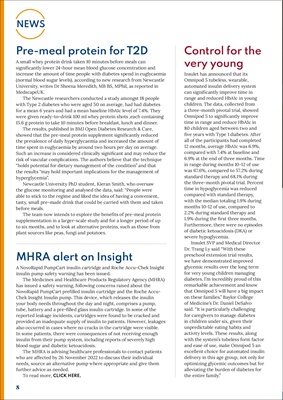
8
NEWS
MHRA alert on Solo
A NovoRapid PumpCart insulin cartridge and Roche Accu-Chek Insight
insulin pump safety warning has been issued.
The Medicines and Healthcare Products Regulatory Agency (MHRA)
has issued a safety warning, following concerns raised about the
NovoRapid PumpCart prefilled insulin cartridge and the Roche AccuChek Insight
Insulin pump. This device, which releases the insulin
your body needs throughout the day and night, comprises a pump,
tube, battery and a pre-filled glass insulin cartridge. In some of the
reported leakage incidents, cartridges were found to be cracked and
provided an inadequate supply of insulin to patients. However, leakages
also occurred in cases where no cracks in the cartridge were visible.
In some patients, there were consequences of not receiving enough
insulin from their pump system, including reports of severely high
blood sugar and diabetic ketoacidosis.
The MHRA is advising healthcare professionals to contact patients
who are affected by 26 November 2022 to discuss their individual
needs, source an alternative pump where appropriate and give them
further advice as needed.
To read more, CLICK HERE.
Control for the
very young
Insulet has announced that its
Omnipod 5 tubeless, wearable,
automated insulin delivery system
can significantly improve time in
range and reduced HbA1c in young
children. The data, collected from
a three-month pivotal trial, showed
Omnipod 5 to significantly improve
time in range and reduce HbA1c in
80 children aged between two and
five years with Type 1 diabetes. After
all of the participants had completed
12 months, average HbA1c was 6.9%,
compared with 7.4% at baseline and
6.9% at the end of three months. Time
in range during months 10-12 of use
was 67.6%, compared to 57.2% during
standard therapy and 68.1% during
the three-month pivotal trial. Percent
time in hypoglycemia was reduced
compared with standard therapy,
with the median totaling 1.9% during
months 10-12 of use, compared to
2.2% during standard therapy and
1.9% during the first three months.
Furthermore, there were no episodes
of diabetic ketoacidosis (DKA) or
severe hypoglycemia.
Insulet SVP and Medical Director
Dr. Trang Ly said "With these
preschool extension trial results,
we have demonstrated improved
glycemic results over the long term
for very young children managing
diabetes. I'm incredibly proud of this
remarkable achievement and know
that Omnipod 5 will have a big impact
on these families." Baylor College
of Medicine's Dr. Daniel DeSalvo
said. "It is particularly challenging
for caregivers to manage diabetes
in children under six, given their
unpredictable eating habits and
activity levels. These results, along
with the system's tubeless form factor
and ease of use, make Omnipod 5 an
excellent choice for automated insulin
delivery in this age group, not only for
optimizing glycemic outcomes but for
alleviating the burden of diabetes for
the entire family."
Pre-meal protein for T2D
A small whey protein drink taken 10 minutes before meals can
significantly lower 24-hour mean blood glucose concentration and
increase the amount of time people with diabetes spend in euglycaemia
(normal blood sugar levels), according to new research from Newcastle
University, writes Dr Sheena Meredith, MB BS, MPhil, as reported in
MedscapeUK.
The Newcastle researchers conducted a study amongst 18 people
with Type 2 diabetes who were aged 50 on average, had had diabetes
for a mean 6 years and had a mean baseline HbA1c level of 7.4%. They
were given ready-to-drink 100 ml whey protein shots ,each containing
15.6 g protein to take 10 minutes before breakfast, lunch and dinner.
The results, published in BMJ Open Diabetes Research & Care,
showed that the pre-meal protein supplement significantly reduced
the prevalence of daily hyperglycaemia and increased the amount of
time spent in euglycaemia by around two hours per day on average.
Such an increase is considered clinically significant and may reduce the
risk of vascular complications. The authors believe that the technique
"holds potential for dietary management of the condition" and that
the results "may hold important implications for the management of
hyperglycemia".
Newcastle University PhD student, Kieran Smith, who oversaw
the glucose monitoring and analysed the data, said: "People were
able to stick to the regime and liked the idea of having a convenient,
tasty, small pre-made drink that could be carried with them and taken
before meals.
The team now intends to explore the benefits of pre-meal protein
supplementation in a larger-scale study and for a longer period of up
to six months, and to look at alternative proteins, such as those from
plant sources like peas, fungi and potatoes.